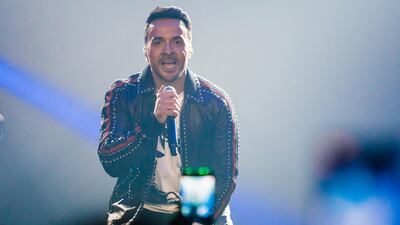With Despacito breaking all sorts of records in the charts, not to mention being the most streamed song of 2017, it's easy to forget that singer Luis Fonsi is a bonafide star in South America rather than a new upstart.
That said, the Puerto Rican is revelling in the extra attention the reggaeton blockbuster brought him. New territories opened up to the 40-year-old sensation, with the artist selling out tours in Europe, singing in an exclusive star-studded gala concert as part of last year’s Dubai International Film Festival and headlining the mammoth Mawazine Festival in Morocco.
Speaking before his performance in front of a 50,000-strong crowd in Rabat last month, Fonsi acknowledges that despite Despacito's enduring appeal, and in spite of incessant touring, there remains a sizeable amount of people who view him as a new artist. "But that's okay," he says. "I always view these shows as a way to introduce myself to the crowd, and me to the country. It's about building a relationship where I can keep coming back."
A steady approach
That studious approach has been working for Fonsi, both in the studio and on stage. Where normally an unexpected chart hit would tempt artists and their labels to rush-release a follow-up single or album, Fonsi bided his time and delivered the single Echame la Culpa eleven months later. While the track, featuring American singer Demi Lovato, was an assured slice of Latin pop, it simply didn't set the charts on fire the way its predecessor did.
His latest track, however, has the makings of another chart monster. With Calypso, Fonsi teams up with British-Jamaican rapper Stefflon Don for an ode to island life. The picturesque video of a sun-kissed Puerto Rico should do wonders for the Caribbean island's tourism board – it has amassed more than 90 million views on YouTube in the space of three weeks.
Fonsi knew the track was a keeper when he had trouble explaining it to his friend. “I just didn’t know how to describe it. I was stuck and I just love that feeling,” he says. “The song is a hybrid and has a freshness to it, which is key. As a songwriter, I am always looking for new trends and introducing new sounds.”
The African connection
Indeed, where Despacito helped usher in a new wave of appreciation for reggaeton, Calypso is a nod to the Caribbean's African roots through its use of steel drums and lyrics featuring patois and French – languages used by the region's Afro Latino community.
“The verses in the song have this African beat, which is starting to really break commercially. It has this “ca-ca-ca, ca-ca” rhythm, which is African, and it’s really popular now in Brazil. They call that style “funky,” he says. “At the end of the day I am from Puerto Rico and we are a mix of Latino and African so we grow up with that rhythm inside of us.”
It is that exchange of culture that excites Fonsi, and that he credits for his success. He says his latest world tour was a nightly reminder of how music has the ability to bring people together, with Despacito serving as an example.
“I am an artist who sings in Spanish and that song was able to break that language barrier. People ask me, why did you wait 20 years to write a crossover hit? And my answer to that is, I didn’t. I just sang another song in Spanish,” he says. “But music can be so powerful that it can bind and unite cultures and borders. Some of my songs are bilingual, and I love how I can go to the United States and see people learning Spanish so they can sing along, while in South America, they do the same thing for the English lyrics.”
Fonsi says it's that desire to connect globally that makes him maintain the relative wholesomeness of his music. A father of two and former mentor on The Voice Chile, he says that positivity will always be a key aspect of his work. "I want to include everybody, and I feel blessed that I can speak to fans who are young, as well as to parents and grandparents," he says.
“I think that comes from the positivity in the songs. Most of mine are love songs, and while some are more sensual than others, they never cross that line or come across as too strong or vulgar. That is something that’s very important to me, because it can help me inspire everyone.”
________________________
Read more:
Album review: ‘Scorpion’ finds Drake stung and self-absorbed
From South America to a dance floor near you: looking at the rise of reggaeton
Artists of Arabic heritage making waves in mainstream hip-hop


